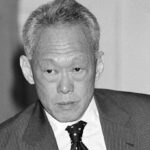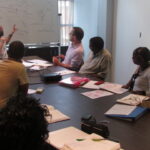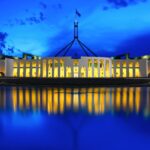
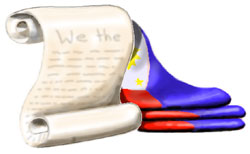 The 1987 Constitution of the Philippines is Flawed…
The 1987 Constitution of the Philippines is Flawed…
These flaws unfortunately contribute to all the major problems we continue to encounter in our daily lives as Filipinos. Massive Poverty, Massive Unemployment, Corruption, Rampant Criminality, Separatist Insurgency, Communist Trouble-making, Political Instability, Overcrowding in Metro Manila, Massive Traffic Jams, Pollution, the “drug mule” problem, dislocation from families among OFW’s, the Pork Barrel Scam, you name it — all these are symptoms of the systemic root problems caused by the flaws of the 1987 Constitution.
The CoRRECT™ Movement pushes for these main Three Constitutional Reforms:
 Economic Liberalization
Economic Liberalization
Dismantle Protectionism. Attract investors. Create more jobs.
If we are looking to increase the employment situation in the Philippines, then we must attract as many investors as possible by removing the restrictive provisions in the 1987 Constitution, so that MNC’s can invest & create employment opportunities.
 Evolving Federalism
Evolving Federalism
Empower the regions, respect diversity, decongest Manila.
If we can amend the Constitution to allow for the Philippines to evolve towards Federalism, through gradual region-based decentralization, the regions & provinces of the Philippines can develop economically & the Capital can be decongested.
 Parliamentary System
Parliamentary System
Platforms & Competence: True leadership, not popularity politics.
If we shift from our faulty and unstable Presidentialism over to Parliamentarism, we will gradually see a change in our politics as campaigns will focus more on parties and their platforms and less on name-recall & the personal popularity of candidates.
 Economic Liberalization
Economic Liberalization
Dismantle Protectionism. Attract investors. Create more jobs.
If we are looking to increase the employment situation in the Philippines, then we must attract as many investors as possible by removing the restrictive provisions in the 1987 Constitution, so that MNC’s can invest & create employment opportunities.
 Evolving Federalism
Evolving Federalism
Empower the regions, respect diversity, decongest Manila.
If we can amend the Constitution to allow for the Philippines to evolve towards Federalism, through gradual region-based decentralization, the regions & provinces of the Philippines can develop economically & the Capital can be decongested.
 Parliamentary System
Parliamentary System
Platforms & Competence: True leadership, not popularity politics.
If we shift from our faulty and unstable Presidentialism over to Parliamentarism, we will gradually see a change in our politics as campaigns will focus more on parties and their platforms and less on name-recall & the personal popularity of candidates.
Constitutional Reform & Rectification for Economic Competitiveness & Transformation
aka CoRRECT™
[adl-post-slider id=4354]
[wpcol_1half id=”” class=”” style=””]When all the three component reform initiatives – Economic Liberalization, Evolving Federalism, & the Parliamentary System, known collectively as the CoRRECT™ Three Point Agenda, are put together, the result is a potent solution that makes the Philippines more conducive to economic development and growth that can help get the Philippines moving up to First World status
This website aims to introduce the Philippine Public to the reasons behind the need for Constitutional Reform & Rectification for Economic Competitiveness & Transformation. We would like to introduce Filipinos to understand what are among some of the easy-to-solve issues that have continued to remain unsolved, simply because many of our leaders and elites have unfortunately been unable to look at root causes.
We are hit by many problems such as:
1) Chronic Unemployment & Mass Poverty.
This leads to high crime, misery among the masses, and even forces Filipinos to become OFW’s and sometimes get into desperate situations that lead them to become drug mules or get trafficked into prostitution.
Only Economic Liberalization by removing anti-FDI provisions in the Constitution will start solving that.
2) Impoverished countryside, overcongested Capital.
This leads to mass migrations from the regions towards Metro Manila and forces Filipinos to crowd themselves into the Capital where housing is a problem, causing our people to live in slums. Meanwhile, the rest of the country suffers.
Only Evolving Federalism by enshrining region-based decentralization in the Constitution will start solving that.
3) Political Instability, Misgovernance, Disrespect for Authority
Our current political system causes the Philippines to be one of the most chaotic and anarchic of countries in the region. We also have ended up with lousy governance and the adoption of wrong policies which have contributed to the lack of trust and respect among our people towards government and our authorities.
Only redefining the System of Government in the Constitution as a Parliamentary System will start solving that.
 In case you are interested in helping out to craft a proposed constitution or set up amendments to the current Constitution, you may want to join in the
In case you are interested in helping out to craft a proposed constitution or set up amendments to the current Constitution, you may want to join in the
Virtual Constitutional Convention which is a wiki facility in this site that allows volunteers and other interested participants to propose constitutions or amend/edit other proposals. Click on the icon or HERE to go straight to it.
[/wpcol_1half]
[wpcol_1half_end id=”” class=”” style=””][yd_list_posts]
[/wpcol_1half_end]
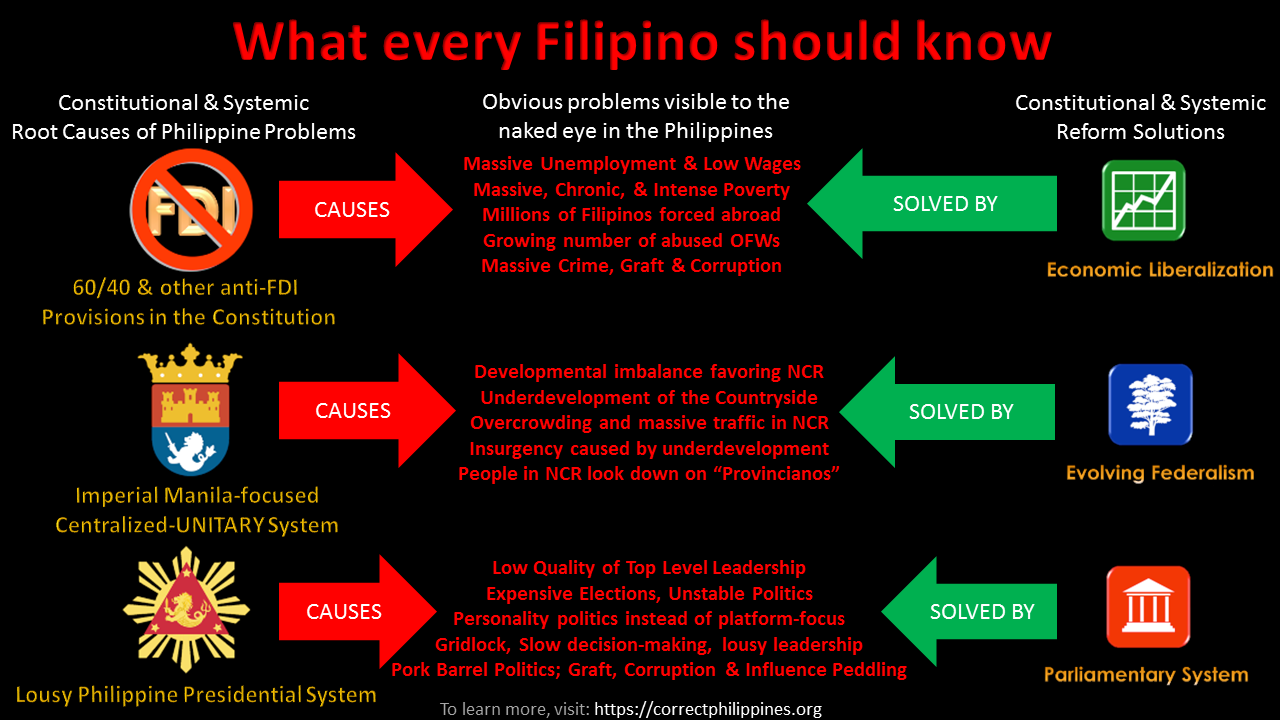
Every single time there are Filipinos who go against Constitutional Reform, it’s always a matter of ignorance and wrong facts.
The people who are against these reforms simply do not understand it. Their knowledge about the current system is so flawed that they think that the current system is ok. They have very little understanding of what a true functioning system ought to be like, and as a result, they make the mistake of assuming that the system in the Philippines is ok.
Worse, their understanding of the reforms being pushed is also extremely substandard. They don’t know how economics works and don’t understand that by being more open to Foreign Direct Investors by removing the anti-FDI restrictions and 60/40 clauses in the Constitution actually goes a long way in attracting more investors to come in. They go against what they do not understand. Then there’s their lack of understanding of what Federalism is or how it works. They often fail to realize that some of the countries they admire the most such as the USA, or others like Australia, Austria, Belgium, Canada, Germany, and Switzerland happen to use Federalism.
And then there’s their utter ignorance about the Parliamentary System. They don’t know what it is or how it works, and oftentimes, they mistakenly think that the late Ferdinand Marcos’ Martial Law system was a Parliamentary System, when actually, we never had a functioning parliamentary system under Ferdinand Marcos during Martial Law, and afterwards, when it was lifted and Cesar Virata who was Finance Minister was made Prime Minister, that still wasn’t a parliamentary system as it was actually more like a Peruvian-style Presidential System, appearing Semi-Presidential like the French, but with the President fully in control, and the Prime Minister acting purely as an underling of the president.
Ultimately, the biggest problem is a lack of knowledge.
This website seeks to cure that problem by providing all the relevant information and knowledge so that more and more Filipinos can be informed and enlightened about what these reforms are and why we desperately need them.
The Philippines Must Learn from Singapore
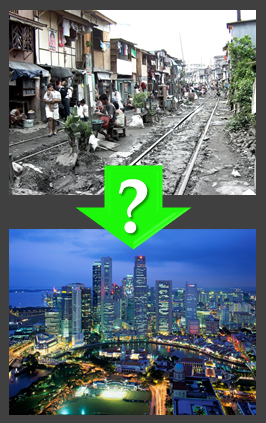 Singapore used to be much poorer and less developed than the Philippines back in the 1950s and 1960s, but as a result of policies designed to make Singapore much more open to foreign direct investors & multinational corporations, S’pore attracted more companies to come in. More jobs were created and unemployment & poverty were drastically reduced. As a result, S’pore became the richest in Asia. On the other hand, the Philippines with its highly restrictive anti-foreign investor restrictions in the 1987 Constitution, continues to turn investors off, making jobs scarce – keeping most Filipinos poor & desperate.
Singapore used to be much poorer and less developed than the Philippines back in the 1950s and 1960s, but as a result of policies designed to make Singapore much more open to foreign direct investors & multinational corporations, S’pore attracted more companies to come in. More jobs were created and unemployment & poverty were drastically reduced. As a result, S’pore became the richest in Asia. On the other hand, the Philippines with its highly restrictive anti-foreign investor restrictions in the 1987 Constitution, continues to turn investors off, making jobs scarce – keeping most Filipinos poor & desperate.
Singapore serves as a perfect example as the Philippines can easily learn to be open to foreign direct investors and multinational corporations in order to create more jobs. In the interest of political stability, the Philippines can also learn from how Singapore’s parliamentary system firstly allowed it to be able to end up with competent leaders like founding father Lee Kuan Yew and his People’s Action Party and see how it tends to be much more stable, efficient, and less prone to corruption. Lastly, because the Philippines is much bigger than Singapore, emulating Singapore requires that the Philippines autonomize its regions so that the regions all act each like Singapore and together attract investments and improve their own economies.
It’s also worth noting that Malaysia – whose majority Malays & Bumiputras are culturally similar to Filipinos – took many key learnings and insights from Singapore too. As a result, Malaysia is also one of the ASEAN region’s better economies. It’s time to quit being Asia’s Basketcase of Wasted Democrazy! [fikraticker]





